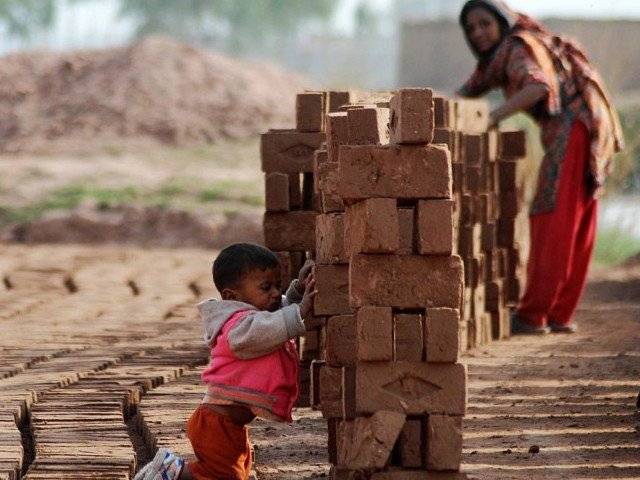
It has been almost a decade now since Massi Aasia (real name changed to protect identity), my mother’s help in domestic chores, started working at our place. We had a few others before her as well. I’ve seen them come and go since my early childhood but this one’s different enough to write about.
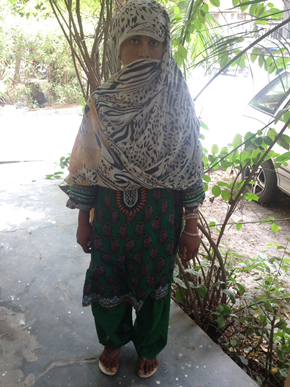
At times I caught Massi doing things that left me in absolute shock. For instance, once while sweeping away the garbage in my room, she found a used small pack of Nestle juice with the straw poked in. To my amazement, instead of throwing it away with the garbage, she began to suck on the straw. Only a few days earlier, I had seen her struggling with water taps as she didn’t even know how to use them. While all the other maids we had were super smart, Massi didn’t know how to dust off the furniture, wash dishes, or iron clothes when she first came to work for us.
This sparked a lot of curiosity in me and I finally decided to talk to her about this apparent “weirdness” of hers. After visiting her place, I came to know about not just the abject poverty that people like her live in but also many other heart-wrenching realities. I understood the meaning of “living below the poverty line” only that day.
Massi, with her one married son, lives in the Bhatta’s workers residential colony where employees work day and night to produce bricks for meagre wages. The owners of brick kilns provide free residence to the workers but the houses are what we call katchay and mostly comprise of one bedroom and one yard along with a washroom.
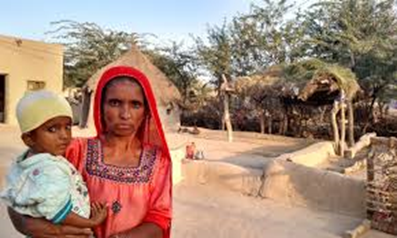
Living in a brick kiln colony is not an easy thing to do and even more so when you are a woman. The miseries that these women have to go through are unimaginable for people like you and me but we could, at the very least, give some acknowledgment to their plight. This is why I wanted to write this piece today about the life of Massi Aasia and point out some major problems that women in Bhatta colonies face. So, here goes.
Residents of brick kilns all around the country have the same issues of safety. People who work in these brick kilns basically have no skills or education to work elsewhere. Their mental capability is quite low and there isn’t much sense of humanity as well. As Massi narrated her story, she told me how she married off her daughter at the age of 10 and how child marriages are something of a tradition in these illiterate communities. Deeply offended in the beginning but broken by the end of Massi’s narration, I realized that marrying girls off at such a young age is the only way to guarantee their safety. The whole environment of these places is so bad that if these people don’t get their daughters married as early as possible, they’d either be kidnapped or raped. The administration seems least bothered about this grave crisis and the tradition of marrying young girls away, in an age when they ought to be playing with toys, continues to thrive.
One of the biggest issues these people have is obtaining loans on heavy interest from loan sharks. Since the wages are really low, workers have no option but to take loans from brick kiln owners or some other influential of the area for different purposes like healthcare. However, these loans come with a very high interest rate. The amount of the loan combined with interest is then deducted from their monthly income leaving only half of the amount and at times even less than that. Decades go by but these people never really manage to free themselves from the clutches of these loan sharks and have a big chunk of their income deducted every month.
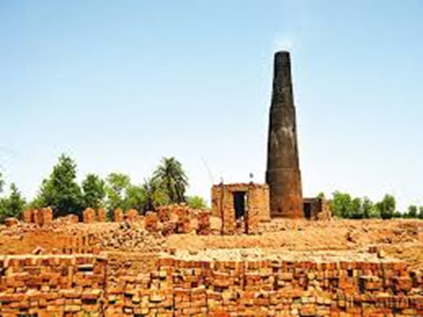
The worst part is that until one does not return the loan fully, one is not allowed to leave the brick kiln to adopt any other profession. New kids are born, raised, and forced to work with their family to pay off the loan but this slavery never ends.
1 rupee per brick is the standard wage rate of brick kiln workers regardless of the time and effort it takes to prepare one brick. The previous government raised this rate to Rs 1100 per 1000 bricks but it was never implemented. Laborers work through the blazing hot summers as well as freezing winters producing about 800-1000 bricks every day and then get half their wage deducted for the loans they have taken. Poverty soars to new heights in these colonies where the people continue to live like vermin.
Moreover, even after this extreme cruelty, the brick kiln administration charges an amount of Rs 1500-2500 monthly in the name of electricity bills. Mind you, these bills are never shown to the residents. A Munshi (factory accountant) once told my Massi that her real billing amount was a lot less but the factory and colony administration randomly charge money from all the workers. After all, how much electricity can one pedestal fan consume?
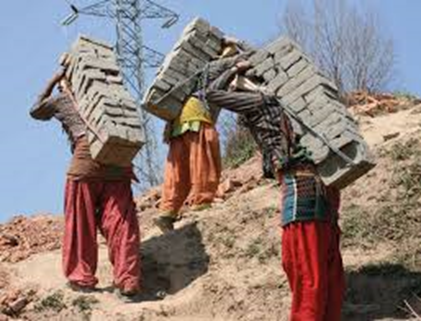
Free healthcare should be the basic right of these residents but the fact is that there is not even a dispensary or small clinic in any of these colonies. If in need of a medical checkup, these people have to rush to a nearby village to get treatment in a government-opened dispensary. Most of the time, these dispensaries are ill-equipped with poorly trained personnel and only stock meds for either flu, fever, or other such routine illnesses.
In the case of a medical emergency where something bigger like an X-ray is needed, these people prefer visiting private hospitals because they are completely ignored by staff at government hospitals. This is another reason why these people have no option but to take loans from the brick kiln administration. It seems like, just like every other government department, you need a strong reference here too to stay alive.
Something that breaks my heart in this whole scenario is the total absence of education as there are not even primary schools in the Bhatta colonies. The closest education facilities are government schools in nearby villages where free education is provided if one has a CNIC. But since most of these people are not even registered Pakistanis, their children remain illiterate and grow up to toil away their days and nights in the same oppressive conditions in brick kilns.
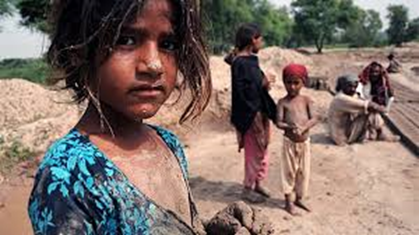
Despite all these grievous circumstances and unfortunate events happening in every moment of her life, Massi succeeds in keeping herself alive through her loving nature. Speaking about Massi, her daughter-in-law says, “She treats me so well that people think I am her real daughter.” Every relative of Massi I know praises her for her kindness and virtue. Massi hopes that one day the government will take note of this “Bhatta mafia” and free them all from the worst kind of slavery imaginable.

Massi Asia
At times I caught Massi doing things that left me in absolute shock. For instance, once while sweeping away the garbage in my room, she found a used small pack of Nestle juice with the straw poked in. To my amazement, instead of throwing it away with the garbage, she began to suck on the straw. Only a few days earlier, I had seen her struggling with water taps as she didn’t even know how to use them. While all the other maids we had were super smart, Massi didn’t know how to dust off the furniture, wash dishes, or iron clothes when she first came to work for us.
Massi, with her one married son, lives in the Bhatta’s workers residential colony where employees work day and night to produce bricks for meagre wages. The owners of brick kilns provide free residence to the workers but the houses are what we call katchay and mostly comprise of one bedroom and one yard along with a washroom.
This sparked a lot of curiosity in me and I finally decided to talk to her about this apparent “weirdness” of hers. After visiting her place, I came to know about not just the abject poverty that people like her live in but also many other heart-wrenching realities. I understood the meaning of “living below the poverty line” only that day.
Massi, with her one married son, lives in the Bhatta’s workers residential colony where employees work day and night to produce bricks for meagre wages. The owners of brick kilns provide free residence to the workers but the houses are what we call katchay and mostly comprise of one bedroom and one yard along with a washroom.

Source: Herald
Living in a brick kiln colony is not an easy thing to do and even more so when you are a woman. The miseries that these women have to go through are unimaginable for people like you and me but we could, at the very least, give some acknowledgment to their plight. This is why I wanted to write this piece today about the life of Massi Aasia and point out some major problems that women in Bhatta colonies face. So, here goes.
The amount of the loan combined with interest is then deducted from their monthly income leaving only half of the amount and at times even less than that. Decades go by but these people never really manage to free themselves from the clutches of these loan sharks
- Safety Crisis for Young Girls
Residents of brick kilns all around the country have the same issues of safety. People who work in these brick kilns basically have no skills or education to work elsewhere. Their mental capability is quite low and there isn’t much sense of humanity as well. As Massi narrated her story, she told me how she married off her daughter at the age of 10 and how child marriages are something of a tradition in these illiterate communities. Deeply offended in the beginning but broken by the end of Massi’s narration, I realized that marrying girls off at such a young age is the only way to guarantee their safety. The whole environment of these places is so bad that if these people don’t get their daughters married as early as possible, they’d either be kidnapped or raped. The administration seems least bothered about this grave crisis and the tradition of marrying young girls away, in an age when they ought to be playing with toys, continues to thrive.
- The Vicious Cycle of Never Ending Loans
One of the biggest issues these people have is obtaining loans on heavy interest from loan sharks. Since the wages are really low, workers have no option but to take loans from brick kiln owners or some other influential of the area for different purposes like healthcare. However, these loans come with a very high interest rate. The amount of the loan combined with interest is then deducted from their monthly income leaving only half of the amount and at times even less than that. Decades go by but these people never really manage to free themselves from the clutches of these loan sharks and have a big chunk of their income deducted every month.

The worst part is that until one does not return the loan fully, one is not allowed to leave the brick kiln to adopt any other profession. New kids are born, raised, and forced to work with their family to pay off the loan but this slavery never ends.
- Low Wages & High Bills
1 rupee per brick is the standard wage rate of brick kiln workers regardless of the time and effort it takes to prepare one brick. The previous government raised this rate to Rs 1100 per 1000 bricks but it was never implemented. Laborers work through the blazing hot summers as well as freezing winters producing about 800-1000 bricks every day and then get half their wage deducted for the loans they have taken. Poverty soars to new heights in these colonies where the people continue to live like vermin.
Moreover, even after this extreme cruelty, the brick kiln administration charges an amount of Rs 1500-2500 monthly in the name of electricity bills. Mind you, these bills are never shown to the residents. A Munshi (factory accountant) once told my Massi that her real billing amount was a lot less but the factory and colony administration randomly charge money from all the workers. After all, how much electricity can one pedestal fan consume?
- No Healthcare

Free healthcare should be the basic right of these residents but the fact is that there is not even a dispensary or small clinic in any of these colonies. If in need of a medical checkup, these people have to rush to a nearby village to get treatment in a government-opened dispensary. Most of the time, these dispensaries are ill-equipped with poorly trained personnel and only stock meds for either flu, fever, or other such routine illnesses.
The closest education facilities are government schools in nearby villages where free education is provided if one has a CNIC. But since most of these people are not even registered Pakistanis, their children remain illiterate
In the case of a medical emergency where something bigger like an X-ray is needed, these people prefer visiting private hospitals because they are completely ignored by staff at government hospitals. This is another reason why these people have no option but to take loans from the brick kiln administration. It seems like, just like every other government department, you need a strong reference here too to stay alive.
- Bhatta People: A Totally Illiterate Crowd
Something that breaks my heart in this whole scenario is the total absence of education as there are not even primary schools in the Bhatta colonies. The closest education facilities are government schools in nearby villages where free education is provided if one has a CNIC. But since most of these people are not even registered Pakistanis, their children remain illiterate and grow up to toil away their days and nights in the same oppressive conditions in brick kilns.

Source: Aljazeera
Despite all these grievous circumstances and unfortunate events happening in every moment of her life, Massi succeeds in keeping herself alive through her loving nature. Speaking about Massi, her daughter-in-law says, “She treats me so well that people think I am her real daughter.” Every relative of Massi I know praises her for her kindness and virtue. Massi hopes that one day the government will take note of this “Bhatta mafia” and free them all from the worst kind of slavery imaginable.
